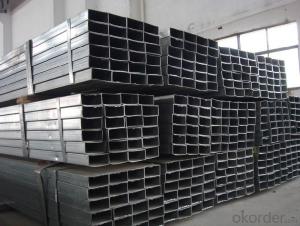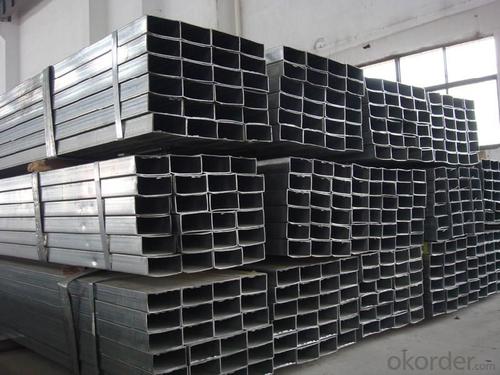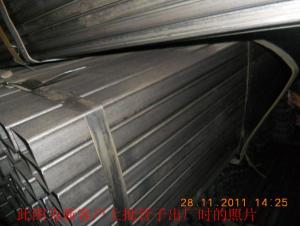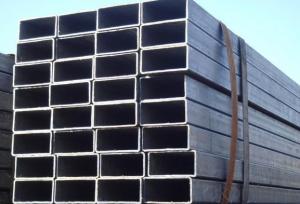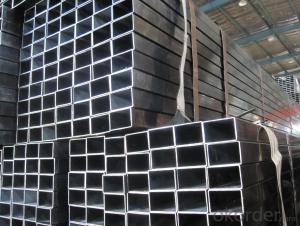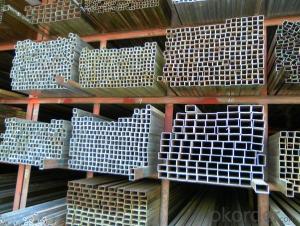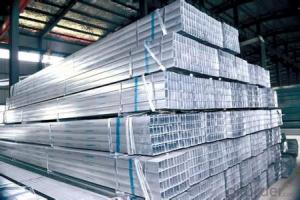Rectangular Hollow Section pipe
- Loading Port:
- China Main Port
- Payment Terms:
- TT OR LC
- Min Order Qty:
- -
- Supply Capability:
- -
OKorder Service Pledge
OKorder Financial Service
You Might Also Like
Product Name | ||
Size | Size: | 10*10--500*500mm |
Thickness: | 0.45--16mm | |
Length: | 3-12m | |
Steel Grade | Q195,Q215,Q235,Q345,16Mn, 20# | |
Standard | ASTM A500,EN10219,GB/T6728,GB/T6725,JIS G3466 | |
Usage | 1. For Structure, Airport, Railway 2. Construction and so on. | |
Ends | Plain end or By Your Choice | |
Surface | Bared Or With Oiled Or Galvanized | |
Technique | ERW ,Hot Rolled and Cold Rolled | |
Section Shape | Rectangular | |
Inspection | With Hydraulic Testing, Eddy Current , Infrared Test | |
Package | Bags, Bundle, In Bulk, Containers | |
MOQ | 20 Metric Ton / Can Be Negotiated | |
Supply Ability | 15,000 Metric Ton/Month | |
Date of Delivery | 7 days(Qty within 1000 Metric Ton) or According To The Quantity | |
Port of Shipment | Tianjin, China | |
Payment | L/C T/T | |
- Q: Can steel pipes be used for chemical refineries?
- Chemical refineries can utilize steel pipes for their operations. Steel pipes are frequently employed in chemical refineries because of their exceptional strength, long-lasting nature, and resistance to corrosion. Given the harsh conditions present in a chemical refinery, including exposure to corrosive chemicals and extreme temperatures, it is necessary to employ materials that can endure such circumstances. Steel pipes possess the capability to withstand these challenges and are often preferred for their ability to securely and efficiently transport diverse fluids and gases. Furthermore, the weldability of steel pipes permits easy installation and maintenance within intricate refinery systems. All in all, steel pipes are a fitting choice for chemical refineries due to their durability, ability to resist corrosion, and compatibility with the demanding conditions encountered in this industry.
- Q: How are steel pipes protected against external impact or mechanical damage?
- Steel pipes are typically protected against external impact or mechanical damage through the use of various methods such as applying protective coatings, installing corrosion-resistant materials, using concrete encasement, or utilizing protective shields or guards.
- Q: SC15 what does galvanized steel pipe look like?
- Zinc plating: galvanized steel pipe hot galvanized and galvanized two kinds, hot galvanized, zinc coating thickness, with uniform coating, adhesion, long service life and so on. The cost of galvanizing is low, the surface is not very smooth, and the corrosion resistance of itself is much better than that of galvanized pipe. Refer to
- Q: What are the different methods of joining steel pipes for high-pressure applications?
- The different methods of joining steel pipes for high-pressure applications include welding, threaded connections, flanged connections, and grooved connections. Welding involves fusing the ends of the pipes together using heat, creating a strong and leak-proof joint. Threaded connections involve screwing the pipes together, using threads on the ends of the pipes and pipe fittings. Flanged connections involve using flanges, which are flat, circular discs with bolt holes, to connect the pipes together. Grooved connections involve using grooved couplings that grip the ends of the pipes and are secured with bolts, creating a reliable and easy-to-install joint.
- Q: How are steel pipes used in water treatment plants?
- Steel pipes are commonly used in water treatment plants to transport and distribute water throughout the facility. They are used for various purposes such as conveying raw water from the source to the treatment plant, transporting treated water to storage tanks or distribution points, and carrying chemicals or additives used in the treatment process. Steel pipes are preferred due to their durability, strength, and resistance to corrosion, ensuring the safe and efficient flow of water within the plant.
- Q: What are the different types of steel pipe supports for thermal expansion?
- There are several types of steel pipe supports for thermal expansion, including fixed supports, sliding supports, and variable spring supports. Fixed supports are rigid and do not allow for movement, while sliding supports allow for limited axial movement. Variable spring supports use mechanical springs to accommodate thermal expansion and contraction, providing continuous support while allowing for movement.
- Q: How do you calculate the pipe flow rate for steel pipes?
- To calculate the pipe flow rate for steel pipes, you can use the Hazen-Williams equation or the Darcy-Weisbach equation. These equations take into consideration factors such as the pipe diameter, length, roughness, and the pressure difference between the two ends of the pipe. By plugging in these values into the respective equation, you can determine the flow rate of the fluid passing through the steel pipe.
- Q: How do you protect steel pipes from external damage?
- To protect steel pipes from external damage, several measures can be taken. 1. Coating: Applying a protective coating on the surface of the steel pipes can help prevent external damage. Common coating options include epoxy, polyethylene, and fusion bonded epoxy (FBE) coatings. These coatings act as a barrier between the pipes and the surrounding environment, shielding them from corrosion, abrasion, and other external factors. 2. Cathodic Protection: This method involves using a sacrificial anode or impressed current to protect the steel pipes from corrosion. By connecting a less noble metal to the pipes, it attracts the corrosive elements, sacrificing itself instead of the pipes. This process helps extend the lifespan of the pipes and prevents external damage. 3. Wrapping and Taping: Wrapping the steel pipes with materials such as polyethylene or polypropylene tapes provides an extra layer of protection. These tapes act as a barrier against moisture, chemicals, and physical impact, safeguarding the pipes from external damage. Additionally, heat shrink sleeves can be used to provide insulation and protection against corrosion. 4. Underground Installation: Proper installation of steel pipes underground is crucial to protect them from external damage. This includes ensuring suitable trench depth, backfilling with appropriate materials, and avoiding excessive bending or stress on the pipes during installation. Proper bedding and padding techniques also contribute to the pipes' protection from external factors. 5. Regular Inspection and Maintenance: Periodic inspection and maintenance are essential to detect any signs of external damage early on. This can involve visual inspections, non-destructive testing, or even utilizing advanced technologies like pipeline integrity management systems. Timely repairs and maintenance can help prevent further damage and extend the lifespan of the steel pipes. Overall, protecting steel pipes from external damage requires a combination of preventative measures, proper installation techniques, and regular maintenance. By implementing these strategies, the pipes can be safeguarded against corrosion, abrasion, impact, and other factors that may compromise their integrity.
- Q: How do steel pipes compare to other pipe materials like PVC or copper?
- Steel pipes have several advantages over other pipe materials like PVC or copper. Firstly, steel pipes are incredibly durable and can withstand high levels of pressure and extreme temperatures, making them suitable for a wide range of applications. Secondly, steel pipes have excellent resistance to corrosion, which ensures their longevity and reduces the need for frequent maintenance or replacement. Additionally, steel pipes have a higher strength-to-weight ratio compared to PVC or copper, making them more robust and capable of handling heavy-duty tasks. However, steel pipes can be more expensive and require special equipment for installation. Overall, steel pipes are a reliable and versatile option that offers superior durability and performance compared to other pipe materials.
- Q: How are steel pipes inspected for quality control?
- Steel pipes are inspected for quality control through various methods such as visual inspection, non-destructive testing techniques like ultrasonic testing, magnetic particle inspection, and radiographic testing. These methods help detect any surface defects, cracks, or internal flaws in the pipes, ensuring their quality and reliability.
Send your message to us
Rectangular Hollow Section pipe
- Loading Port:
- China Main Port
- Payment Terms:
- TT OR LC
- Min Order Qty:
- -
- Supply Capability:
- -
OKorder Service Pledge
OKorder Financial Service
Similar products
Hot products
Hot Searches
Related keywords
